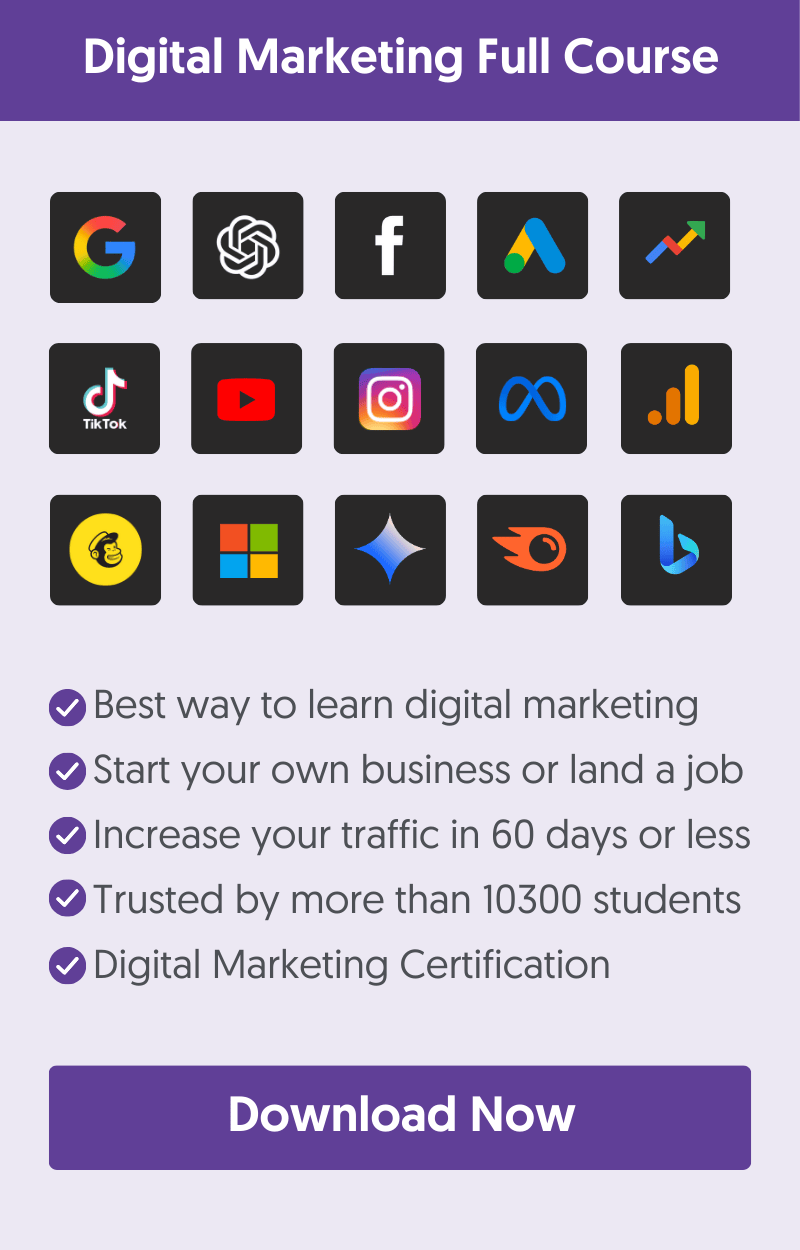Affiliate marketing helps you earn money online by promoting other people’s products and services. It is a great way to generate passive income after the initial effort of getting people to see your affiliate offers.
I know from experience that beginners find it challenging to understand how to make money from affiliate marketing. There are so many resources on the Internet about the topic, and people making all types of claims (how to make money while you sleep with affiliate marketing - is a popular one), which creates a big confusion.
But it doesn’t have to be this way. Affiliate marketing is a great way to make money online, and it’s for real provided that you follow the right strategy.
In this post, I’ll give you the exact steps to follow to succeed with affiliate marketing and start making money. It’s not a get-rich-quick scheme, and it won’t happen overnight, but for sure, it’s the best approach, and it works. 30% of the income generated from this blog is coming from affiliate marketing revenue and is increasing steadily year by year.
Plus, I’ll provide you with several examples of what it takes to make $100 per day with affiliate marketing and how to get that to $1,000 per day.
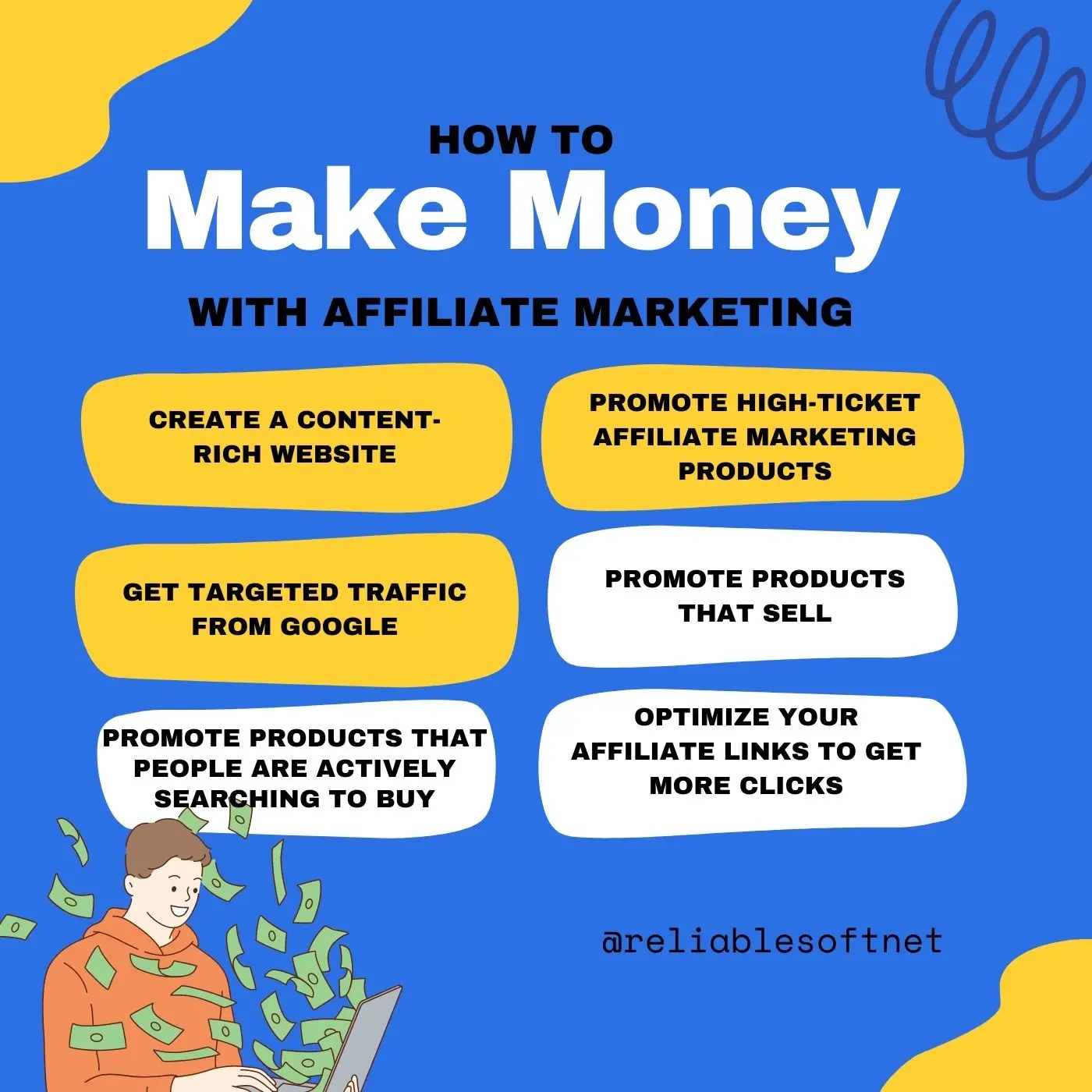
How to Make Money with Affiliate Marketing
- Create a Content-Rich Website
- Get Targeted Traffic From Google
- Promote Products That People Are Actively Searching To Buy
- Promote Products That Sell
- Promote Products That Offer High Affiliate Commissions
- Optimize Your Affiliate Links To Get More Clicks
1. Create a Content-Rich Website
With affiliate marketing, you make money by referring people to the products they need.
Some affiliates use their social media profiles or YouTube channels to share products with potential buyers. However, the most common (and effective) way to get people in front of your affiliate products is to have your own website.
With a website, you can publish high-quality content that attracts visitors and motivates them to continue to the product’s website to complete their purchase.
The key to getting results from your content is to produce a mix of both informational and promotional material.
If all you do is promote one affiliate offer after another, your audience will be less likely to take your recommendations seriously, and you will minimize your chances of getting the attention of Google and Google traffic, which is needed for long-term success.
Instead, you want to focus more of your efforts on providing value to your readers. Over time, this will help you build trust and a connection with your audience. It will also allow you to position yourself as an expert in your industry.
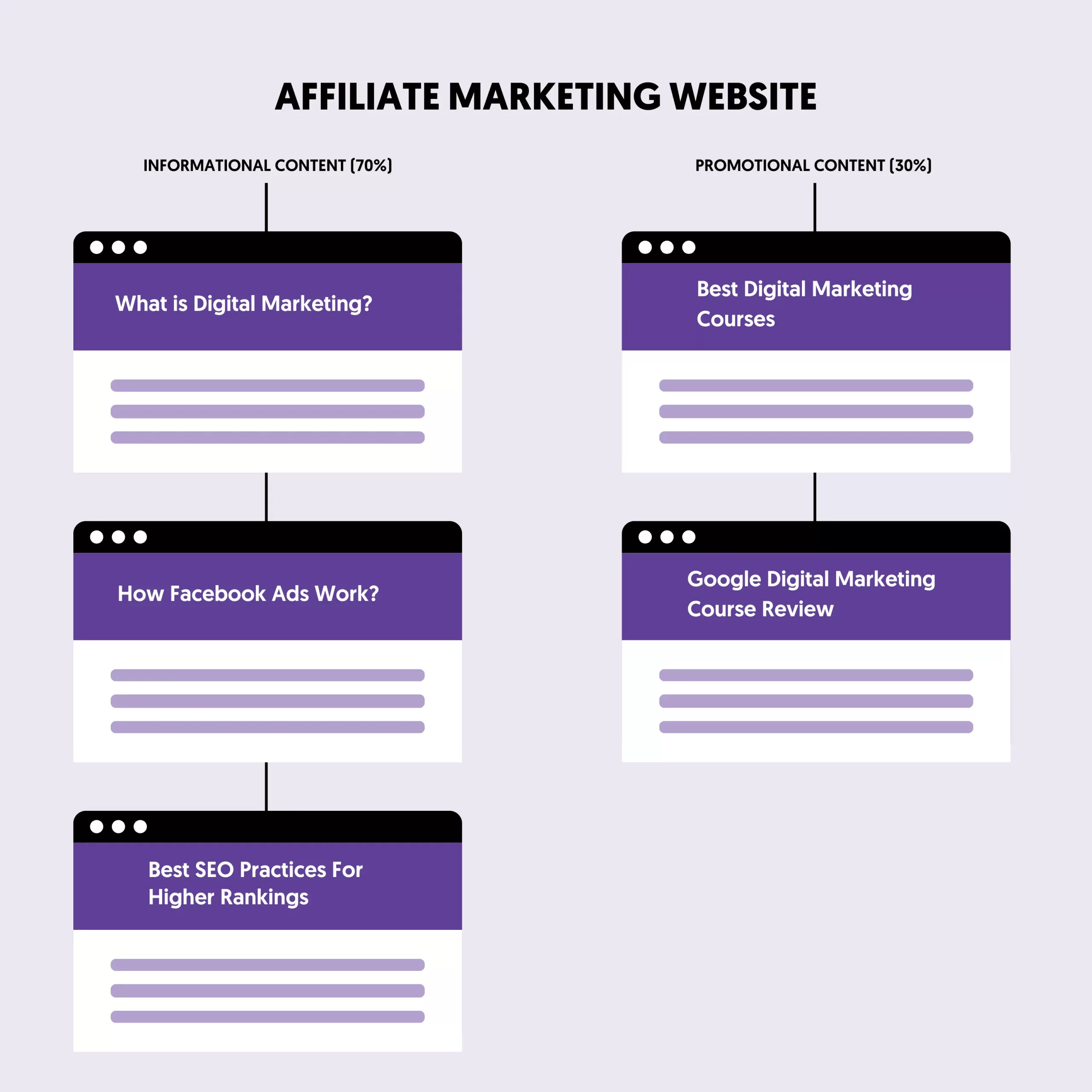
As your reputation grows, new and returning visitors will head to your site when they have a question or need guidance related to the topics you cover.
So, how do you approach creating both informational and marketing content for your site?
We recommend creating around 70% informational content and 30% affiliate marketing content. This ratio will ensure that you have enough content to build authority while still having enough marketing assets to make money on your affiliate offers.
For your informational content, it is good practice to make the most of it evergreen, meaning that it will remain relevant over a long period of time and will not require frequent updating.
The most common type of educational content is “how-to” posts that give readers a step-by-step process for performing a specific task.
For your affiliate marketing content, there are several ways to create content centered around your affiliate products.
One of the best ways to learn how to make money with affiliate marketing is to follow a proven step-by-step course. Our Affiliate Marketing Course will teach you the secrets of successful affiliate marketing strategies.
Product Reviews
One of the most common types of affiliate content is product reviews. With these, you give readers a detailed breakdown of everything they need to know about a product of which you are an affiliate.
When you write product reviews, it is important that the content is truly helpful to readers. Google recently updated how it ranks product reviews to prioritize the content that is the most informative.

This means that instead of just giving surface-level details, you should share any first-hand insights you have and don’t shy away from diving into the weaknesses of a product.
Doing so will make the content seem objective while also showing that you actually have experience with the product.
Other effective types of affiliate content are comparison and roundup posts.
Best of Posts
Roundup posts list multiple solutions for a particular use case. They are essentially less in-depth product reviews for several products at once. You can also think of these as “Best” posts as their titles are often something like “15 Best Tools for”. Here is an example of a roundup post comparing the best social media marketing tools.
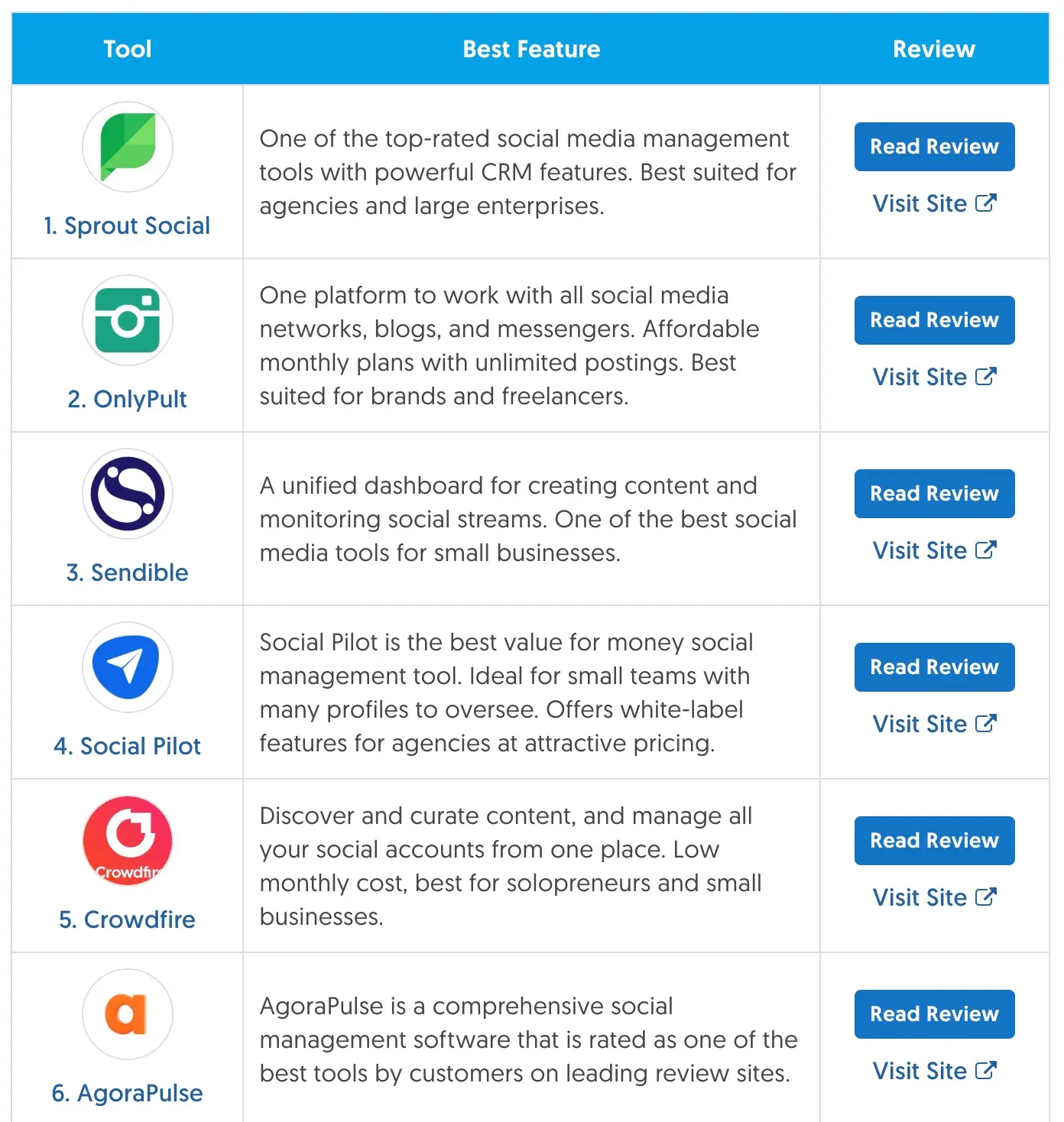
Product Comparison Posts
Comparisons, as the name suggests, will compare two (or more) different products. For example, if you are an affiliate in the web hosting niche, you might write a “Bluehost vs Kinsta” comparison.
2. Get Targeted Traffic From Google
As you enrich your website with high-quality content, you’ll need to devise a strategy for driving people to your site to click your affiliate links and ultimately make purchases.
There are several ways to get visitors to your site. The best of these traffic sources is search traffic from Google and other search engines.
The reason traffic from Google is so valuable is that it allows you to focus on a highly targeted group of people.
You ultimately need people to make purchases if you want to earn any money so you don’t want random or uninterested people on your site.
With Google Search, you know exactly what someone is looking for and can create content that targets the people that are interested in your products.
Keep in mind that not all keywords are the same. While you want to target search terms with high search volume, you also want to ensure that the keywords have purchase intent and are not just general queries.
For example, someone who makes a simple search for “what is a web hosting platform” is likely seeking information and is not ready to make a purchase.
The keywords you want to focus on are those with commercial and transactional intent.
Commercial keywords
Commercial keywords are queries in which the searcher expresses interest in some type of product or service.
These terms can be as simple as a direct search for a brand or product. For example, a search for “Nike shoes”. Or, they can include additional words like “Review, “best”, or “top”.
Because people who make these searches are typically in the market for a product or service, these keywords can be a highly effective way to reach your ideal audience.
Depending on where the person is in their purchase decision, they may be ready to make a purchase immediately or they may need some more information. For instance, someone may know that they need a certain type of product but they want to evaluate different options before making a final choice.
Because of this, reviews, comparisons, and how-to articles are great for targeting commercial search terms.
Transactional keywords
Transactional keywords are queries in which the searcher has the intent to buy something. These are the most valuable of all keywords because they are the terms used by the people closest to making a purchase.
Transactional terms typically include words like “buy”, “discount”, or “for sale”.
In most cases, the searcher has already gathered the information they need and will likely make a purchase after clicking one of the results on Google.
3. Promote Products That People Are Actively Searching To Buy
After you’ve honed in on good keyword targets, your next focus is to choose the products you want to promote.
There are several key qualities to look for, which we’ll go through in the next few steps of our guide on how to make money as an affiliate marketer.
The first is to promote affiliate products with consistent demand. The thought behind this is simple. You need to promote products that people are actually searching for if you hope to generate sales from your marketing efforts.
When creating your plan to get targeted traffic, you will naturally get an idea of the types of products people are searching for. The process will also expose you to specific solutions and brands so that you know the top options in your niche.
While looking for products with an active interest, keep an eye on the level of competition in the niche. The more competitive the keywords are for certain types of products, the harder it will be for you to rank and drive traffic to your site.
The ideal balance is products with strong demand and a manageable amount of competition.
One way to understand the demand for a particular niche is to use Google Trends. With the platform, you can see how interest in specific keywords and topics is changing over time.
This way, you can ensure that any products you are considering have consistent interest and are more than a fleeting trend.
4. Promote Products That Sell
In addition to marketing actively searched products, it is vital that you promote products that sell. By this, I mean promoting products with a high conversion rate.
Conversion rate is a metric that measures the percentage of people that complete a purchase after seeing your products.
A high conversion rate means you are drawing maximum value from your web traffic.
When searching for high-converting products, start by identifying the best solutions in your market. High-quality products from trustworthy brands will naturally perform better than those that aren’t as good.
Price is another important factor that you’ll need to consider. Generally, lower-priced products convert at a higher rate than more expensive ones.
The nature of a product will also affect how well it converts. If you promote commodity items, you can expect higher conversion rates. On the other hand, if you promote high-consideration products that buyers want to thoroughly evaluate before making a decision, you may experience lower conversions.
5. Promote Products That Offer High Affiliate Commissions
High-converting products will help you make money with affiliate marketing, but it is also important to promote products that pay high commissions.
If you earn higher commissions for each order, you need fewer sales to hit your income goals.

To put this in perspective, let's review a couple of different scenarios.
In the first instance, you promote common consumer goods from Amazon that cost between $10 and $20. The affiliate program pays a 5% commission per sale, so you’ll get $0.50 to $1 per sale.
If you were to convert 10% of your traffic, it would take 10 visitors to make $1 and 1,000 visitors to make $100.
Now compare this to an affiliate program where you promote a $100 product and earn 50% or $50 per sale.
With this offer, you only need two sales to make $100. This means that you could convert 1% of your traffic and it would only take 200 visitors to make $100.
Three key factors will determine your level of affiliate commissions: product price, commission rates, and recurring payments.
Sales price
In nearly every affiliate program, the product’s sales price will affect how much you earn for each sale. This is because most programs pay you a percentage of each sale. Others, pay a fixed amount that is reflective of the item’s price and the potential lifetime value of the customer.
For example, the Shopify affiliate program will pay you two times the subscriber’s first monthly fee.
Commission rate
The commission rate is the percentage of the product’s price that you earn when you make a sale. It can have a huge impact on how much money you make with affiliate marketing.
Two different affiliate programs could contain $100 products but if one gives 50% commissions and the other 10%, then one is much more profitable than the other.
Recurring payments
Some of the best high-ticket affiliate programs pay recurring commissions for revenue generated over time. These are often products that have some form of ongoing subscription like a web hosting plan or other software services.
Affiliate products with recurring commissions can be some of the highest paying as they allow you to maximize the value of each buyer.
6. Optimize Your Affiliate Links To Get More Clicks
Affiliate links are how you earn money for sales. When a customer buys an affiliate product after clicking your link, the affiliate merchant will credit you with the sale and pay you the appropriate commission as agreed upon in the program details.
So, the best products won’t do much good if no one clicks your affiliate links. This is why it is important to optimize your link placements to maximize the number of people that click them.
Now, this doesn’t mean you should throw links anywhere and everywhere throughout your content. You only want to add links where they are appropriate and shouldn’t include them when they don’t fit into your content.
Adding too many links can negatively impact the user experience, which in turn can lead to lost sales.
As a general rule, you want to place your links early in your content. Many people won’t make it to the end of your posts and others might skim over the details along the way. By adding your links to the beginning of your content, you increase the chances that more people see them.
Here are some other tips on how to optimize your affiliate links.
Contextual links
The majority of your affiliate link placements will be contextual links. These are URL hyperlinks added to the specific text within the body of your content.
The best place to add these links depends on the type of article you are writing. For example, if you are writing a product review, you can add an affiliate link to the first mention of the product name.
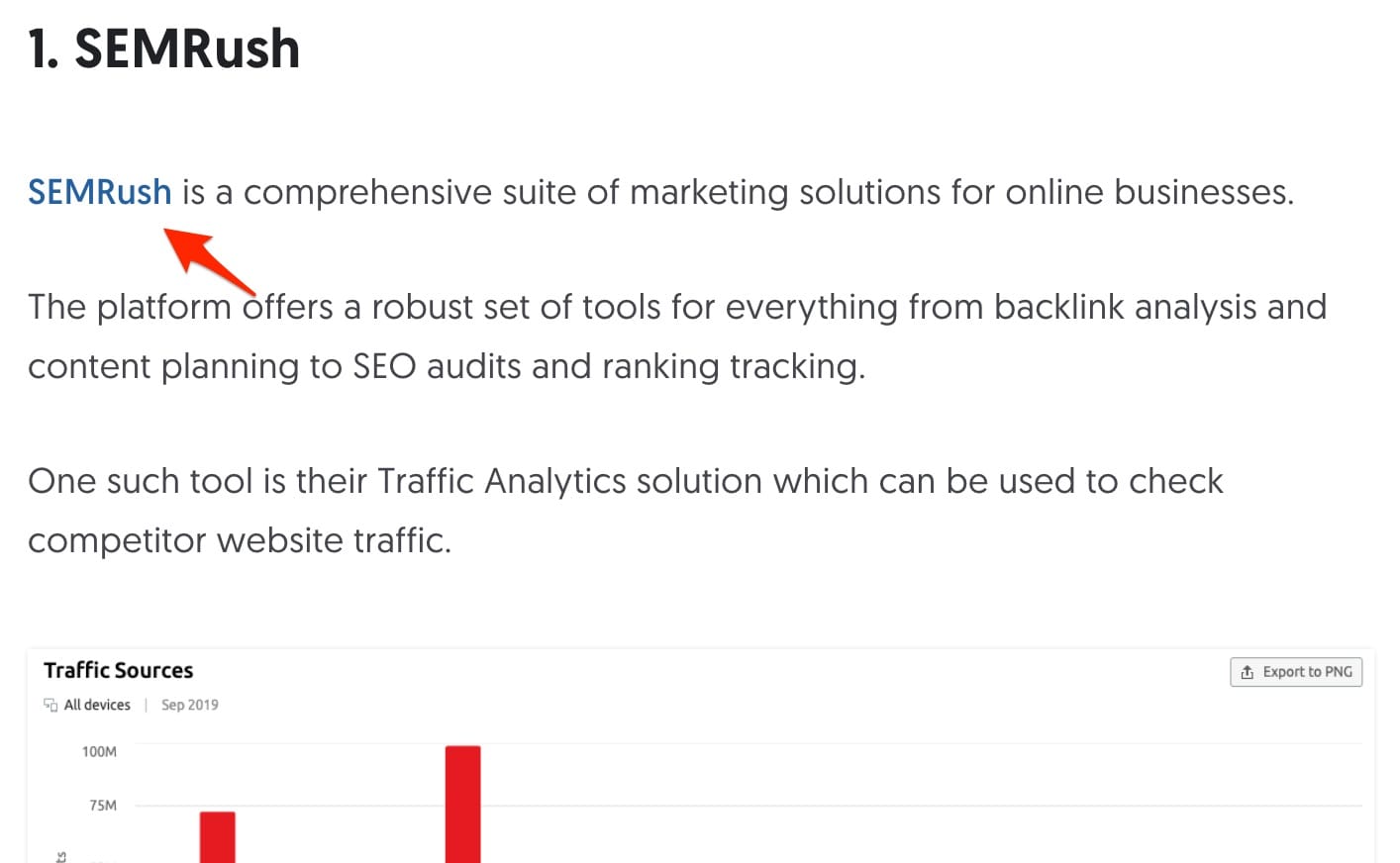
For a listicle comparison analyzing 10 different products, you can add an affiliate link to each product in the corresponding header.
If the content is one of your promotional posts, you can also explore adding a more direct call-to-action (CTA) with the link.
Banners
Contextual links are generally the best for driving sales but it can be useful to include other types of links as well.
Banners give you a way to add visually appealing graphics that catch your visitors’ attention. You can place them on your sidebar or in the middle of your posts.
Many affiliate programs come with banners and other ready-made marketing assets so you don’t have to worry about designing them yourself.
Resources page
A resources page displays a list of various tools that are relevant to your audience. After you have established yourself as an authority in your industry, these pages can be an effective way to direct your readers to your affiliate offers.
For each tool, you can include your affiliate link and a brief explanation of what the tool does and why you recommend it.
Another effective way to use your affiliate links is to add them to your email marketing messages.
With your email campaigns, you should follow the same principle of mixing informational and promotional messages.
Add an email subscription to your website and start sending regular emails to your subscribers. Like the content that you post, the more useful information you provide in these messages, the more trust you will build with your audience.
After you’ve established trust with your subscribers, you can then send them the occasional affiliate marketing message.
Consider Using an Affiliate Link Management Platform
One final tip is to use an affiliate link management platform. As you sign up for numerous affiliate programs, you’ll need an efficient way to organize and keep track of all your links.
An affiliate link plugin will give you a centralized place for storing links and you can quickly view stats to see which links are getting the most clicks.
How Much Money Can You Make With Affiliate Marketing?
How much money you can make with affiliate marketing depends on the quality of your website and the niche you enter.
Successful affiliates can make over $1,000 per day and some of the best pull in over $100K each month.
Let’s break down the details of what it would take to hit different income targets with affiliate marketing.
How to Make $100 a Day With Affiliate Marketing
Making $100 a day is a common goal among new affiliate marketers. Depending on the products you promote, you can reach this objective with just a few sales.
The key to scaling up to $100 is to build the initial flow of traffic to your site. It will take some time for your content to rank for relevant keywords, but once you do your earnings will quickly grow.
A simple way to see what you need to do to make $100 a day is to calculate exactly how much targeted traffic you need to get to your site.
A good benchmark for affiliate conversion rates is 1% of your web traffic. This means that if you promote a product like Shopify which pays $58 per sale, you would need 200 visitors per day (or 6,000 per month) to generate the two sales needed to make $100 per day.
You can get an idea of how much content you would need to create by looking at:
- The monthly search volume for your target keywords
- Your expected clickthrough rates (CTR)
The specifics vary for each term, but the average CTR for pages in the 5th position in a Google search is around 10%.
So let’s say you were able to get the 5th spot for all your target keywords, this means you would need to target keywords with a total of 60,000 monthly searches to get the 200 visitors per day.
How to Make $1,000 a Day With Affiliate Marketing
To reach $1,000 a day with affiliate marketing, having a high-commission product that converts well is even more important. There is a massive difference in the amount of traffic you need to get to sell a hundred $10 products every day vs ten $100 products.
Going off of our previous example, you would need to scale your keyword targeting to include relevant terms with 600,000 searches per month.
It is difficult to find keywords with this volume which is why affiliates tend to promote several different products.
For example, the term“Shopify review” only gets around 700 searches per month. You could expand your reach by promoting a few other eCommerce platforms and targeting the term “best eCommerce platform”, which gets around 500 per month.
You can also expand to other solutions that are related to your niche. In our example, web hosting platforms would be a good choice. You could then target product-specific terms like Bluehost review, and other commercial terms like “best web hosting for beginners”.
Again, the importance of promoting high-paying products is essential to hitting this income goal. It would take an extensive amount of time to gain the necessary traffic if you were promoting low-paying items.
Other Ways to Make Money Online
Besides making money with affiliate marketing, there are other ways to use your expertise and skills to make money online. You can use the guides below to get started.
- How to Make Money as a Blogger - a thorough guide on how to start a blog and make money through affiliate marketing, selling ads, or your own products online.
- How to Make Money with Digital Marketing - a comprehensive tutorial on how to use digital marketing to make money online.
- How to Make Money with SEO - a step-by-step article on how you can earn money online by selling SEO services to clients.
- How to Make Money on YouTube - learn how much YouTubers make with ads and other ways of monetizing their YouTube success.
Conclusion
Making money with affiliate marketing starts with understanding what people are searching for and finding the best high-paying products that match their interests. You can then create high-quality content that brings these people to your site and direct them to your affiliate offers.
Follow the steps in the guide and check out some of our other content on how to make money in affiliate marketing.
